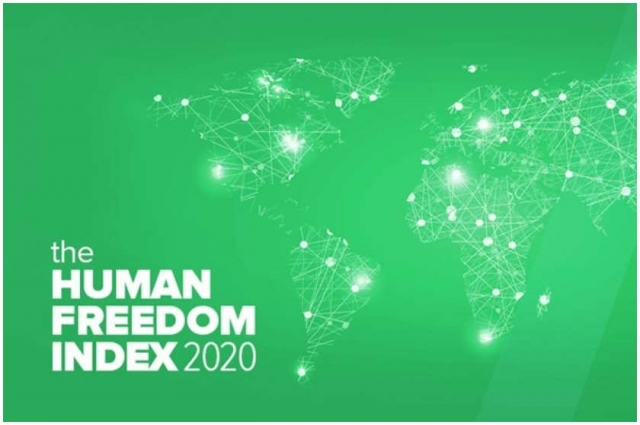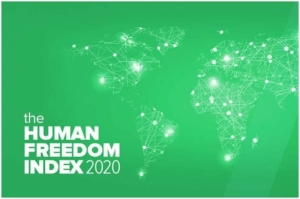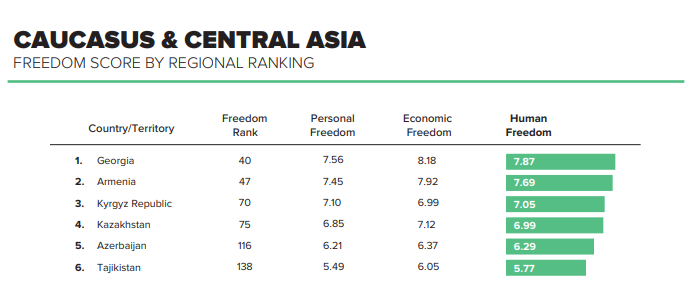2020 Human Freedom Index: Georgia in Leading Position in Caucasus Region
The Human Freedom Index 2020, a worldwide ranking of civil, economic and personal freedom, released on Thursday, ranked Georgia in 40th place worldwide and in the leading position in the Caucasus region.
Notably, for the second time this year, Georgia is in the best, the first zone, ie., among the countries where human freedom is most guaranteed. Georgia was first named among the first category countries last year.
Worldwide, based on the index, Georgia, with the Human Freedom Index of 7.87, comes after countries such as France, Slovenia, Slovak Republic, Bulgaria, Croatia, Uruguay, and is ahead of the countries such as Panama, Costa Rica, Albania, Cabo Verde, Bahamas, Poland and Armenia.
In the Caucasus and Central Asia, Georgia is in the leading position with a Human Freedom Index of 7.87.
In recent years, personal freedom has declined significantly around the world, and the worst is likely yet to come, finds a new study.
“Troubling developments include the Chinese Communist Party intensifying its attack on freedom, regimes in Hungary and Poland continuing to undermine the rule of law and suppress media freedom, and dictatorships in Egypt and other Arab countries ramping up repression,” said Fred McMahon, Dr. Michael A. Walker Research Chair in Economic Freedom at the Fraser Institute and co-author of this year’s Human Freedom Index.
The index, based on 2018 data (the most recent year of available comparable data), uses a 0 to 10 scale to measure personal freedom, which includes the rule of law, safety and security, identity and relationships (LGBTQ and women’s freedom), and freedom of movement, speech, assembly and religion, alongside economic freedom, and the ability of individuals to make their own economic decisions without government or crony interference.
While economic freedom globally increased slightly from 2008 to 2018, personal freedom fell by 0.21 points, with declines in all but two of the 10 years. Religion saw the largest decrease in freedom (0.63) followed by identity and relationships (0.43) and rule of law (0.31).
The rule of law also has the lowest overall score at 5.09. New Zealand tops this year’s freedom index, followed by Switzerland, Hong Kong, Denmark and Australia (although due to Beijing’s accelerated suppression, we expect Hong Kong’s freedom score to decline significantly in the coming years).
The five least free countries are (in descending order) Iran, Yemen, Venezuela, Sudan and Syria.
Overall worldwide rankings for other significant countries include Canada (6th), Germany (9th), the United Kingdom and the United States (tied for 17th), France (33rd), South Africa and Indonesia (tied for 68th), Malaysia (83rd) Mexico and Colombia (tied for 86th), India (111th), Russia (115th), Turkey (119th), China (129th) and Saudi Arabia (151st).
Regionally, from 2008 to 2018, the Middle East and North Africa saw the largest declines, while North America and Western Europe experienced small declines yet remained the freest regions worldwide.
Crucially, people in freer countries are more prosperous than those in less-free countries. For example, the average per-capita income for the top-quartile countries on the index was $50,340 compared to $7,720 for the least-free quartile in 2018.
“When people are free, they have more opportunity to prosper and lead happier, healthier lives,” said Ian Vásquez, report co-author and director of the Cato Institute’s Center for Global Liberty and Prosperity.
The 10 freest and the least-free countries in the 2020 Human Freedom Index:
The 10 freest jurisdictions:
1. New Zealand
2. Switzerland
3. Hong Kong
4. Denmark
5. Australia
6. Canada
7. Ireland
8. Estonia
9. Germany
10. Sweden
The 10 least-free countries:
153. The central African Republic
154. Algeria
155. Iraq
156. Libya
157. Egypt
158. Iran
159. Yemen
160. Venezuela
161. Sudan
162. Syria
The Human Freedom Index (HFI) presents a broad measure of human freedom, understood as the absence of coercive constraint. This sixth annual index uses 76 distinct indicators of personal and economic freedom in the following areas: • Rule of Law • Security and Safety • Movement • Religion • Association, Assembly, and Civil Society • Expression and Information • Identity and Relationships • Size of Government • Legal System and Property Rights • Access to Sound Money • Freedom to Trade Internationally • Regulation of Credit, Labor, and Business.
The HFI is the most comprehensive freedom index so far created for a globally meaningful set of countries representing 94% of the world’s population. The HFI covers 162 countries for 2018, the most recent year for which sufficient data is available. The index ranks countries beginning in 2008, the earliest year for which a robust enough index could be produced.
Read the full Human Freedom Index 2020 here













